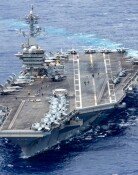Settlement of Nuke Crisis Could Boost Trade by 23%
Settlement of Nuke Crisis Could Boost Trade by 23%
Posted February. 12, 2007 07:41,
If the North Korean nuclear crisis is resolved, the volume of North Koreas international trade will increase by 23 percent compared to last year, but if not, it will decrease by 33 percent, according to a recent study by the Korea Institute for International Economic Policy (KIEP).
The Economic Conditions of North Korea in 2007 released on Sunday by the KIEP, points out that the preconditions of settling North Koreas nuclear deadlock are the continuation of the six-party talks on a regular basis, an agreement on a road map to dismantle the Norths nuclear weapons program, and rapid progress in diplomatic relations between the U.S. and North Korea.
Once North Koreas nuclear deadlock is broken, its external trade in machinery, electronic equipment and raw materials will surge as economic sanctions imposed by the U.N. will be lifted, the report said.
Considering the fact that North Korea has achieved external trade growth of 8 percent each year since 2000, its total trade in 2007 is expected to increase between 16.7 and 23.3 percent compared to last year, recording between $3.5-3.7 billion.
The report also indicates that investments from international communities will also dramatically increase.
When the September 19 joint statement was signed in 2005, the budget for energy assistance programs to North Korea, including the provision of heavy fuel oil, electricity supply, and the construction of a light water reactor was between $8-14 billion. Therefore, the KIEP estimates that somewhere between $0.8-1.4 billion will be annually invested in North Korea in the coming decade.
However, the KIEP believes that if the six-party talks over the North Korean nuclear crisis are stalled, the communist regimes volume of foreign trade will remain similar to last years. This is possible because China and Russia, which do not want the North Korean regime to collapse, are likely to support the North through economic cooperation and aid.
Meanwhile, Chinas investment in North Korea is expected to decrease by half (between $40-60 million) compared to last year due to a sudden decrease in investment from three northeastern provinces in China.
If the six-party talks are suspended, China and Russias economic cooperation and aid to North Korea is likely to diminish and it will deal a significant blow to the North Korean economy, according to the report. If this happens, new investment will be almost completely cut and North Koreas external trade will plunge by 33 percent compared to last year, breaking the 2 billion mark.
jinhup@donga.com







